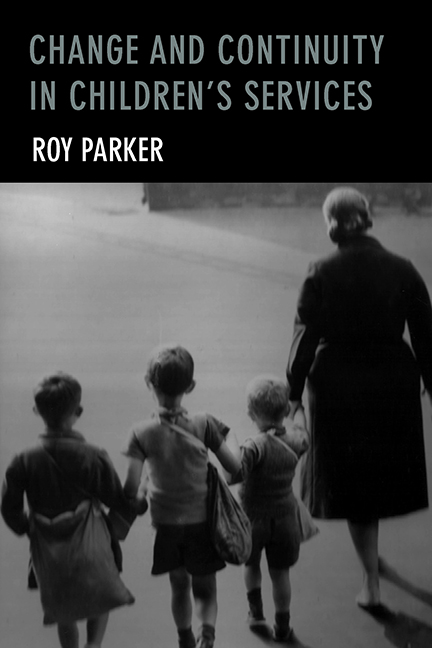Book contents
- Frontmatter
- Dedication
- Cover illustration
- Contents
- Acknowledgements
- Preface
- 1 Introduction: patterns of change and continuity
- 2 Residential child care: an historical perspective
- 3 From boarding-out to foster care
- 4 The evolution of landmark legislation
- 5 Getting started with the Children Act 1948: what do we learn?
- 6 Child care in the melting pot in the 1980s
- 7 Trends, transitions and tensions: children’s services since 101 the 1980s
- 8 Reflections on the assessment of outcomes in child care
- 9 The role and function of inquiries
- 10 Evidence, judgement, values and engagement
- 11 Emerging issues: looking ahead
- Notes and references
- Bibliography
- Index
11 - Emerging issues: looking ahead
Published online by Cambridge University Press: 07 March 2022
- Frontmatter
- Dedication
- Cover illustration
- Contents
- Acknowledgements
- Preface
- 1 Introduction: patterns of change and continuity
- 2 Residential child care: an historical perspective
- 3 From boarding-out to foster care
- 4 The evolution of landmark legislation
- 5 Getting started with the Children Act 1948: what do we learn?
- 6 Child care in the melting pot in the 1980s
- 7 Trends, transitions and tensions: children’s services since 101 the 1980s
- 8 Reflections on the assessment of outcomes in child care
- 9 The role and function of inquiries
- 10 Evidence, judgement, values and engagement
- 11 Emerging issues: looking ahead
- Notes and references
- Bibliography
- Index
Summary
It's hard to say how the children's services might develop in the future, particularly the more distant future. New problems will arise, different policies will emerge and social trends may take us by surprise. Despite welcome advances in our understanding and in the amount of data that is available, prediction still remains hazardous. Nevertheless, there are several ways in which we can anticipate what may lie ahead, at least in the fairly short term.
One way is to see what significant changes are already discernible and then to consider how they might develop and what new issues that might provoke. The use of private for-profit children's services by local authorities is one such an example. An examination of statistical trends may offer another way of looking into the future of the children's services. There are numerous examples, but three offer useful illustrations as well as being important in their own right: children's ethnic origins, their disabilities and their gender. Yet another way of considering how the children's services may develop is to consider whether certain longstanding problems may be able to be moderated, problems such as how best to prevent the grave misfortunes that befall too many children. Each of these approaches is explored in what follows.
I The private provision of services
The rapid increase in local authority commissioning of private for-profit children's services in the last two decades was discussed in Chapter 7. Nevertheless, a brief recapitulation of the salient points will serve to introduce a consideration of the issues that are evident now and of others that may arise.
Foster care
Before 2001 statistics about private foster care related to the informal and unorganised service that was provided for parents who were unable to look after their children themselves. Those who took in children on this basis and were paid were required to notify the local authority and were then subject to inspection. In England in 2012 there were 1,780 such ‘notifications’. However, 2002 saw the publication of an additional set of statistics that recorded the number of children who were looked after by local authorities but who were living in foster homes arranged and supervised by ‘independent agencies’, mainly private for-profit but also voluntary.
- Type
- Chapter
- Information
- Change and Continuity in Children's Services , pp. 147 - 166Publisher: Bristol University PressPrint publication year: 2015



